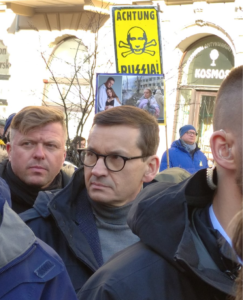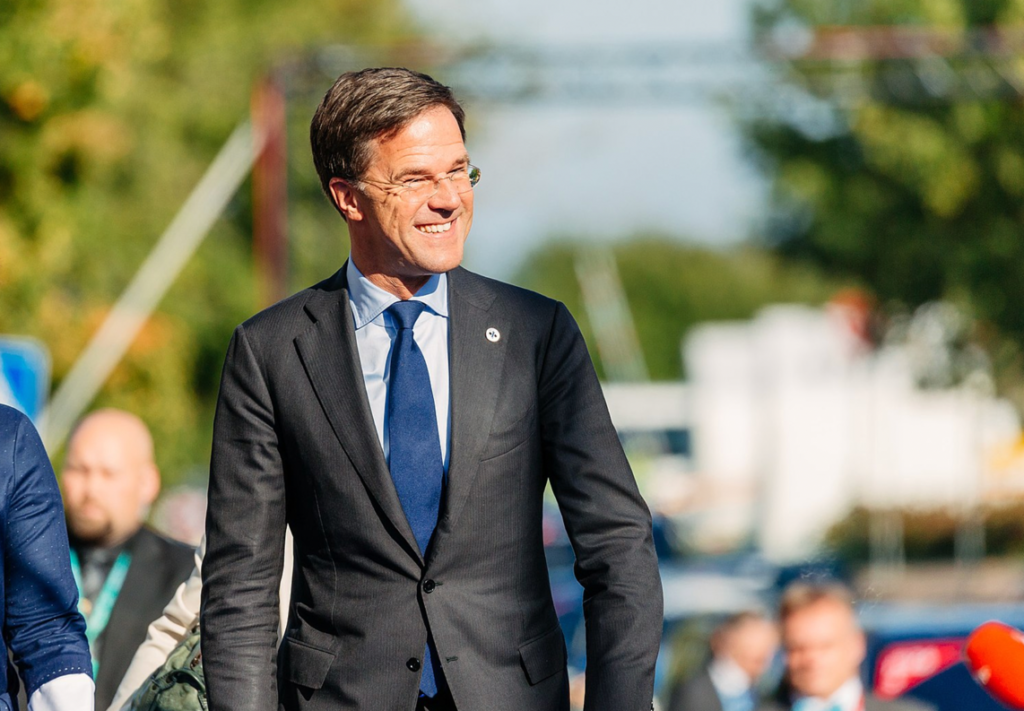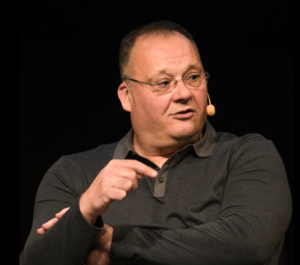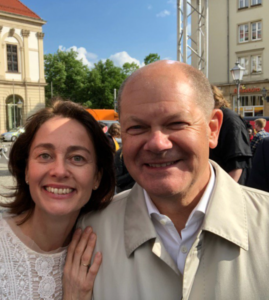Dr. Katarina Barley, 4th Vice-President of the European Parliament © European Union
When Ur-Namma seized power in the Mesopotamian city of Ur, in 2112 BCE, he set aside the brutality and cruel despotism of his predecessors. According to the opening chapter of Fernanda Pirie’s superb book, The Rule of Laws (which I heartily recommend anyone who has ever had an intertest in governance and fairness), he declared: “I did not deliver the orphan to the rich. I did not deliver the widow to the mighty. I did not deliver the man with only one shekel to the man with one mina (sixty shekels). I did not deliver the man with only one sheep to the man with one ox…I eliminated enmity, violence, and cries for justice.” Ur-Namma even got his scribes to write out his claims on clay tablets and he also drew up a set of rules for himself to follow. Pirie who is professor of the anthropology of law at the University of Oxford writes that they are “the earliest laws that archaeologists have discovered anywhere in the world.” We should all be thankful to Ur-Namma, a man who put fair governance and proper order above greed and self-enrichment. Living, as he did, more than 4,000 years ago, that makes him a very unusual figure in world history, if little known today. We ought to know him better. Why isn’t there a statue of him somewhere?
Today’s world often seems cruel and unfair: the richest and most ruthless tend to get to the top of the pecking order, while gentleness and kindness get overlooked. Pirrie writes that Ur-Namma’s rules form “the origins of a legal tradition that developed over the next two thousand years, serving as examples for lawmakers in very different lands as they pursued very different visions of order.” Ur-Namma sounds like a thoroughly decent chap; the sort you could invite round for tea to meet your mother and with whom you could enjoy a slice of cake or two.
It seems likely that Ur-Namma would have got along quite well with Dr. Katarina Barley, 4th Vice-President of the European Parliament. “I’m a lawyer by passion,” she told journalist Andreas Rogal for his article about her in the Parliament Magazine. The rule of law is central to her world view; she dislikes seeing the way some member states are engaged in seeming to dismantle public institutions and undermine the principle of an independent judiciary. The plain fact is that to enjoy the benefits of membership of any club, whether it’s political, sporting, literary or whatever, it is necessary to abide by the rules. Within the EU, however, there are invariably some countries that don’t like the idea of listening to critical views from a different polity that is happy (fairly) to accept the “downside” (if it is one) of obedience to a set of rules or principles you’ve happily signed up to in order to enjoy the various benefits of belonging. There is that old saying in English: “there’s no such thing as a free lunch”. Everything carries a price; all you have to decide is whether or not it’s one worth paying.

Currently, it’s Polish prime minister Mateusz Morawiecki who is defying the EU. He sees compliance with the Union’s long-established rules as , effectively, “kow-towing” to the Brussels bureaucrats. This particular problem is really a continuation of a long-running and hoary old disagreement over who holds the reins of power and how tightly. What lies behind it are various principles of democracy, such as the independence of the courts, a free press (media freedom), women’s rights, attitudes towards and the rights of migrants and the rights of people who identify as being LGBTQ. These are the sorts of issues with which, I think, Ur-Namma would have had no problems. Neither would Katarina Barley. As it is, Poland’s ‘go-it-alone’ attitude to the law has most certainly set Warsaw up in direct opposition to Brussels, denying that EU law overtops Polish law, even if that’s what it says in the Treaties. Poland’s Constitutional Court has accused the EU institutions of acting outside their remit and overstepping their own rules. It would seem that Poland alone holds such a view. Poland has the support of Hungary, of course. Hungarian Prime Minister Viktor Orbán is no lover of Brussels, although the massive pro-EU demonstrations held in Poland would tend to suggest that ‘Polexit’, if it ever happens, won’t happen very soon, especially because most Poles support membership. A poll of Poles suggests that 88% of them want their country to remain a member. Orbán clearly has a lot of propagandizing to do.

WARNINGS AND EMPTY GESTURES
The leaders of France and Ireland have urged Poland to get back into line, while Dutch Prime Minister Mark Rutte has issued oblique warnings that it may be hard for the EU to agree funding for Warsaw’s pet projects if the anti-Brussels rhetoric continues. He also urged other member states to be tough over it. Perhaps the problem – at least partially – is that today’s leaders are too young to remember the savage rule of the Third Reich and the countless millions who died, or else think it would be much better this time around because “they” would be in charge, instead of a bunch of uniformed Nazis wearing swastikas. Rutte would seem to have the undoubted support of Katarina Barley. She has issued an ultimatum to Poland, warning that it could be blocked from receiving any further EU funds, including money from the Covid rescue package, if Warsaw really moves away from EU legislation. The furious outburst, echoed by leading political figures across Brussels, came after Poland’s Constitutional Tribunal ruled that parts of EU law are incompatible with the Polish constitution.
Which rather begs the question: in that case, how did Poland join the EU in the first place? And why? Barley warned that: “The Polish government has its constitutional court, which is occupied by political forces, who certify that it will no longer have to comply with European law in the future.” Most Poles like their country being in the EU, so much of the rhetoric and posturing by their political leaders would appear to be gamesmanship, rather than policy. The Constitutional Court’s decision, however, creates a huge dilemma: the country cannot comply with both courts simultaneously. The court’s decision, according to Barley, “forces the [European] Commission to really take concrete action, and this action has to be and will be financial action because there are measures in place that the Commission can take now.” It seems so obvious that it will be impossible to prioritise EU judgements AND those of Polish courts, where they disagree, at least in the conventional three-dimensional universe we all inhabit. Perhaps Morawiecki has found a way to cross the space-time divide and travel in two (or more) directions at once: a Dr. Who of politics.

Katarina Barley told the news service Deutsche Welle that the EU is all in favour of the Polish people, but added that it may become necessary “for us to take a stance towards their government,” following the court’s ruling.
It’s strange that in all the time since Poland joined on 1 May 2004, nobody has hitherto noticed that it shouldn’t have done. Only now has the country’s Constitutional Court noticed that EU laws and Polish laws are not compatible.
The Constitutional Court’s decision has been published in the official gazette, making it legally binding. It would seem, then, that Poland wants to stay in the EU but not abide by its rules. It’s a bit like joining, say, a golf club, then insisting on playing rugby on the greens.
TAKING TURNS AND BEING FAIR
Barley is a firm believer in caution; she is not in favour of impetuous actions without full consideration being given to the various factors. Few things are decided well on the spur of the moment. For instance, the EU is considering letting Ukraine become a candidate for EU membership, but Barley has urged caution. “I’m pretty sure that all EU member states are willing to smooth the way for Ukraine to join the EU,” she told Der Spiegel. She pointed out that different member states have different ideas about the time scale. Of course, it would be wrong to admit a new country into the club just to annoy Vladimir Putin. That would be dangerously rash. Even so, “Candidate status,” Barley told Der Spiegel, “would be an important signal to Moscow that the EU will not be intimidated when it comes to defending our values.” She did add a cautious rider, however, that the associated requirements should not be interpreted too loosely. Barley has made it plain that this is not because Ukraine requires extra care; far from it. “This is also important with a view to other accession candidates, some of whom have been waiting for years for their procedures to move forward.” In other words, there must be no queue-jumping. “We owe them equal treatment,” she said. But it’s not just fairness that makes her cautious. “There must be no hasty accession,” Barley told the Neue Osnabrücker Zeitung. “Once you are in the EU, you cannot be excluded.”

That will probably be seen as reassuring in Poland, but only if the Polish courts start obeying EU rules, something they seem unlikely to do. Barley reminded readers that: “It is all the more important that the criteria laid down for accession, such as institutional stability, a functioning market economy and the rule of law, are fully met.” The European Commission has already recommended granting Ukraine the status of “EU Accession Candidate”. However, we shouldn’t forget the old saying in English: “There’s many a slip ‘twixt cup and lip”, especially while Putin is trying to jog your arm.
Strangely, Putin has raised no objection to Ukraine joining the EU. The Russian President told TRT World: “We have nothing against it. It is not a military bloc. It’s the right of any country to join economic unions”. This was Putin’s response when asked about Ukraine’s chances of being accepted for membership. The EU doesn’t worry him, it’s NATO that does. He has claimed that it was the fear of Ukraine becoming a member that led to his “special military operation” (which everyone else calls an invasion). Dmitri Medvedev, who has come up with some bizarre comments, such as that Joe Biden is a “strange grandfather with dementia”, that the EU leaders are “lunatics” and that Russia will ensure that Ukraine “disappears from the map” in the near future, was once Russia’s president and is now its prime minister, and he claims Russia had no choice but to invade Ukraine; it was the right decision, he says. “It was very hard to make it, but it was forced and necessary. It was a decision by a sovereign country that has an unconditional right, based on the U.N. Charter, to defend its security,” he added. How Russia’s security was threatened is not clear. Medvedev regularly repeats the lie that Ukraine isn’t really a country at all. Putin repeated the claim to US President George W. Bush at the 2008 NATO summit, but as the Ukrainian Socialist Soviet Republic it came into being in 1922 – exactly a century ago. In 1932, Joseph Stalin imposed a deliberate famine on the country, killing some three million Ukrainians in one year. It was so bad that some Ukrainians even welcomed the Nazi occupation as a way to challenge Moscow’s control. Bad idea: the Nazis murdered more than 1.5-million Jews, while millions of non-Jewish Ukrainians were forced to do hard labour for the Nazis. One way or another, Ukraine always seems to get cards dealt from the bottom of the deck, and almost invariably bad ones.

The European Parliament is not short of people who see hatred as a useful political tool. When the European Parliament President, David Sassoli died in January, 2022 from a serious complication related to his immune system, a far-right German MEP, Nicolaus Fest of the Alternativ für Deutschland party, Tweeted “finally, that filthy pig has gone”. It was the sort of hate speech that the AfD is known for, but although Fest has expressed regret that his Tweet was leaked, he has not apologised, nor shown any sign of regret. Sassoli never permitted hate speech in the Parliament, which may be why it was targeted at him when he died. The AfD leader, Jörg Meuthen, has expressed his regret at the comments but Fest seems unrepentant. Other MEPs have been swift to pay their respects for Sassoli, including, of course, Katarina Barley. Katarina Barley, vice president of the Parliament and a member of the German Social Democrats, told ARD Fest’s comments were “characteristic of their author and of that contempt for humanity against which Sassoli has always stood resolutely.” She told POLITICO: “One of the many reasons why David Sassoli was respected across party lines was that he did not tolerate hate speech in the European Parliament. Mr. Fest’s statement is despicable and an example of the hatred and indecency that David always stood firmly against. The fact that Mr. Fest refuses to apologize for his indecent remarks speaks for itself.” It’s an unusually fierce comment from the normally cautious Barley, not given much to hyperbole.

FOLLOWING WHAT’S RIGHT (FAR RIGHT, THAT IS)
If it was the aim of the far-right parties in Europe to disrupt normal proceedings and, if possible, damage or even dismantle moves towards European unity, they would appear to be winning, at least on one level. It ‘s only necessary for one of the more extreme politicians of Poland or Hungary to utter some comment to the media and there are immediate headlines: “Is the EU getting soft?” or “EU caves in” or “Far right wins again”. Of course, many of the newspaper printing these stories are, at the very least, far right sympathisers. Their reactions to signs that Brussels is, at least, putting up with these things come as no surprise. The row with Warsaw over whose laws are the most important is inevitable.
The influential Dutch politics professor, Cas Mudde, argues in his book, The Far Right Today, that the movement he studies is set apart from the more common area of right-wing thinking by being “anti-system” and, to a large extent,“hostile to liberal democracy”. He further divides the far right into two parts: the “extreme right”, which rejects the essence of democracy (such as popular sovereignty and majority rule), and the “radical right”, which accepts the democratic system but “is opposed to fundamental elements of liberal democracy, such as minority rights, the rule of law and the separation of powers”. Under his “extreme right” heading, you’ll find Germany’s Nazis and Italy’s Fascists from the 1930s, along with the more modern movements like the alt-right in the US, or the Identitarian movement in Europe. Telling them apart is never simple and, some would argue, is also fairly pointless. As it is, von der Leyen stands accused of giving in to what amounts to blackmail. Doing that means abandoning “European-ness”, which Barley would never have done, nor approved of seeing done in her name. “There are three main reasons,” Barley told a television interviewer. “One is a personal one, that I am really a European from head to toe. My whole family is European, where I live is at the border of four European countries, and my whole life has been European. The second one is that, of course, now is the time where a lot of decisions are being taken in Europe, a lot of decisions that really will determine how this Europe will develop, where we’re going to go and what kind of Europe we want, and it’s the place to be at the moment.

The third reason is my political party, which I wanted to support. We’re having a hard time at the moment in Germany and I wanted to do my share to help.” There’s no room in Barley’s world for political compromise, no ‘half-way house’. If one is to hear those cries for justice wherever you are, you must listen hard and shut your ears to the white noise of unimportant (but noisy) political squabbling. Being truly European is very important.
Katarina Barley, in her rôle as Vice President of the European Parliament, is on record as having called for the removal of Hungary’s right to vote in the EU because of the frequent threats of extortion by the Orbán government. In an interview with MDR Aktuell, in n-tv.de, Barley pointed out that Hungary was abusing the principle of unanimous consent that is commonly used in the European Union. Barley believes that because of its frequent violations of the rule of law, Hungary’s right to vote can in principle be suspended. She said it is no longer possible to talk about “democratic and constitutional conditions” now that the country has gradually fallen into the hands of Viktor Orbán.
Quoted in the publication ‘Hungarian Politics’, Barley noted that “the principle of unanimous consent was adopted when the European Union had only six members, but has become unwieldy for 27 Member States. The problem is that the principle of unanimity can only be resolved through unanimous consent,” she said. The Orbán government recently drew yet more negative attention for repeatedly threatening to veto the sanctions package containing an oil embargo on Russia if the name of Moscow’s Patriarch Kirill, an ardent Putin supporter (whose claims to being a Christian are at best dubious), is not removed from a list of people facing sanctions.

It was. Barley is not alone in her concerns that EU leaders tend to give in to Hungary and Poland, however outrageous their demands. In this case, Orbán alleged that targeting the acquisitive patriarch amounted to religious persecution, even though, to outsiders, Kirill seems to display no sign of religion at all. It’s even alleged that he served in the KGB and has been involved in drug and sex trafficking. Not very holy, if true.
There is also deep concern about Poland’s law courts, which Barley claimed were mere puppets of the Law and Justice Party, which appears to want to enjoy all the benefits of EU membership but without abiding by any of its rules. Barley has described it as “shameful” that Viktor Orbán is demanding billions of euros to prop up his government and, if he does not receive it, he will refuse to vote to stop Russian oil imports. Barley has proposed that the EU launches a boycott without Hungary which of course is far from optimal, but “Orbán wants a lot of money, and the EU cannot let itself be led,” Barley said. She considered that what the Hungarian leadership is “producing” is “just a taste of what is expected of Budapest, and not only in relation to Russia.” After being re-elected by a large majority, “Orbán will sprinkle sand into the machine even more often,” Barley stressed, adding that “the responsibility for the blockade lies solely with the Head of Government, because the Czechs, Slovaks and Bulgarians are also in a difficult situation, but they are trying to find an acceptable solution. In contrast, Hungary is exploiting the situation for political purposes and is trying to squeeze more money out of Brussels.”
IN GOD, WE MAKE EXCUSES
Barley has other fears about developments in Germany: a rise in anti-Semitism, for instance. This follows an attack in Berlin on a young man, wearing a kippah the traditional Jewish skullcap of Jewish men. A man wielding belts rushed at him, yelling “Jew” in Arabic and trying to strike him. Barley swiftly condemned the attack, which follows an increasingly common pattern. According to Germany’s commissioner for anti-Semitism, German police register around 1,500 anti-Semitic attacks each year, not dissimilar to this one. In this case, the perpetrator was caught and arrested. He was Syrian. But the police say there are two or three such incidents every day and it would be wrong to point the finger of blame at one particular such incident or the nationality of its perpetrator. It’s thought that the breaking of a window at a synagogue in Hanover in the middle of an act of worship for the holy day of Yom Kippur may have been an anti-Semitic attack, too.

In response to the kippah attack, Berlin’s Jewish community is planning a “Berlin wears a kippah” campaign, calling on people of any faith or none to wear the prescribed head covering in a display of solidarity. The upsurge in anti-Semitic attacks is just one more problem for Katarina Barley to wrestle with. Ask a perpetrator what exactly it is about the Jewish faith that they oppose, you’d be lucky to get an answer at all. “We have to admit that anti-Semitism is becoming socially acceptable again,” Barley told the Funke Media Group. “It’s our job to work against this development.” Barley told the Handelsblatt newspaper that the increase in anti-Semitic crimes was “shameful for our country”. She said it’s important that those who promote anti-Semitism – or any racist activity – will be dealt with severely by the law. Hers is an all-embracing Germany, not one that picks and chooses who will be welcome and who will not. If they do feel hostile towards incomers or those of different faiths, they will have Katarina Barley to deal with. Whatever kind of religious hatred may be in the rise, at least we can be sure that Barley is on the side of the angels.

